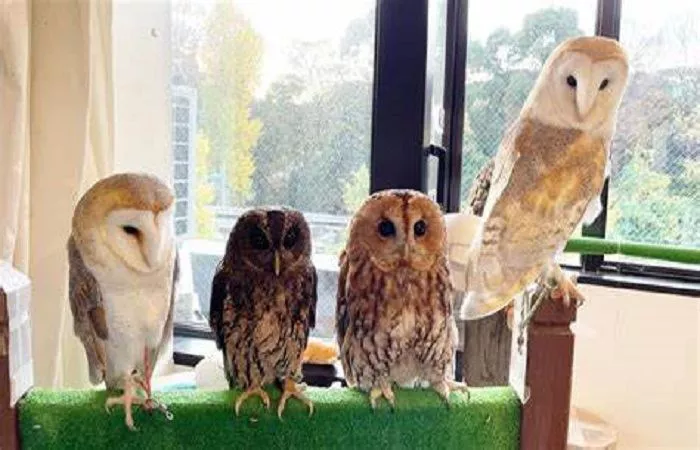Owl cafes have become a popular attraction in Japan, offering visitors the chance to interact with owls while enjoying a cup of coffee. These cafes are part of a broader trend of animal cafes, which also include cat cafes, rabbit cafes, and even hedgehog cafes. However, the ethical implications of owl cafes have sparked considerable debate. This article explores the ethical considerations surrounding owl cafes in Japan, focusing on animal welfare, the impact on the owls, and the broader implications for wildlife conservation.
What Are Owl Cafes?
Definition and Popularity
Owl cafes are establishments where customers can interact with owls while enjoying beverages and snacks. These cafes originated in Japan and have gained popularity among both locals and tourists. The concept is similar to cat cafes, but with owls as the main attraction.
The Experience
Visitors to owl cafes typically pay an entrance fee, which includes a drink and a set amount of time to interact with the owls. The owls are usually perched on stands, and customers can pet them, take photos, and sometimes even hold them under the supervision of staff.
The Ethical Debate
Animal Welfare Concerns
Living Conditions
One of the primary ethical concerns about owl cafes is the living conditions of the owls. Owls are nocturnal birds of prey, and their natural behavior involves hunting at night and resting during the day. In owl cafes, they are often exposed to bright lights and constant human interaction, which can be stressful and detrimental to their well-being.
Restricted Movement
In the wild, owls have large territories and fly freely. In contrast, owl cafes typically keep the birds in confined spaces, limiting their ability to move and fly. This restriction can lead to physical and psychological stress, affecting their overall health.
Impact on Natural Behavior
Disruption of Nocturnal Patterns
Owls are naturally nocturnal, meaning they are active at night and sleep during the day. Owl cafes often operate during daylight hours, forcing the owls to be active when they would naturally be resting. This disruption can lead to sleep deprivation and stress, negatively impacting their health.
Human Interaction
While some owls may appear calm and accustomed to human interaction, this does not necessarily mean they are comfortable. Frequent handling and exposure to strangers can be stressful for these birds, leading to anxiety and behavioral issues.
Conservation and Legal Issues
Sourcing of Owls
The sourcing of owls for cafes is another ethical concern. Many owls are captured from the wild or bred in captivity specifically for the pet trade. This practice can have negative implications for wild owl populations and biodiversity.
Legal Regulations
In Japan, the legal regulations surrounding the ownership and treatment of owls in cafes are relatively lax. This lack of stringent oversight can lead to poor welfare standards and exploitation of the birds.
Coffee Culture and Ethical Consumption
The Role of Coffee Shops
Coffee shops have long been places for social interaction and relaxation. The rise of animal cafes, including owl cafes, adds a unique twist to the traditional coffee shop experience. However, the ethical implications of using animals as attractions must be considered.
Ethical Consumerism
As consumers become more aware of animal welfare issues, there is a growing demand for ethical and sustainable practices in all industries, including hospitality. Ethical consumerism involves making choices that align with one’s values, such as supporting businesses that prioritize animal welfare.
Alternatives to Owl Cafes
Wildlife Sanctuaries and Reserves
For those interested in observing and learning about owls, visiting wildlife sanctuaries and reserves can be a more ethical alternative. These institutions focus on conservation and education, providing a more natural and respectful environment for the animals.
Virtual Experiences
Advancements in technology have made it possible to experience wildlife through virtual means. Virtual reality (VR) and live-streaming platforms offer opportunities to observe owls and other animals in their natural habitats without causing them stress or harm.
Conclusion
Owl cafes in Japan present a complex ethical dilemma. While they offer a unique and entertaining experience for visitors, the welfare of the owls is often compromised. Issues such as poor living conditions, disruption of natural behaviors, and questionable sourcing practices raise significant ethical concerns. As consumers, it is important to consider the impact of our choices and seek out more ethical alternatives that prioritize animal welfare and conservation. By supporting responsible wildlife tourism and ethical businesses, we can help ensure a better future for both animals and humans.
Related topics:
Why Are Filter Coffee Machines Popular in Singapore?
How to Clean Delonghi Coffee Machine
Where Are Zojirushi Coffee Makers Made?


